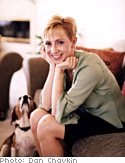Beck On Call
We are all soldiers for freedom.

The most important thing we can do for society, Martha Beck says, is to defeat fear and find freedom in our own lives.
So here we are, a nation at war...kind of. We were told that the war against terrorism would be a new sort of conflict, and so it has turned out to be: no clear battle lines, no obvious enemies, no place that feels completely safe. This is, as President Bush put it, a contest between "freedom and fear," and whether or not you know it, you are a soldier on the front lines, for freedom and fear are conditions of the heart, and whichever claims the most individual human beings goes on to dominate societies and nations. If you want to contribute to this strange new 21st-century war effort, the most important thing you can do for society is to defeat fear and find freedom in your own life.
Concentration camp survivor Viktor Frankl said, "There are two ways to go to the gas chamber: free or not free." The only way to win our freedom back is to face our situation honestly and—no matter how terrible things may be—continue to act on the heart's calm guidance.
Now, it's true that cautionary measures might avoid many disasters, but no matter how careful you are, the ultimate disaster is utterly inevitable. Having struggled with agoraphobic tendencies my whole life, I am a big fan of Emily Dickinson, who spent years hiding in her house, fearing that if she left her "safe place," she would die. So Emily took every precaution—I mean every precaution—and look what happened. She died. Of course, she knew she would. As she put it, "Because I could not stop for Death / He kindly stopped for me...." I can hear those carriage wheels turning right now, if I listen, and so can you. We do not get to choose whether we will die. We can only choose whether we will truly live during the time we are allotted on this earth.
I've learned a lot about happiness from my 13-year-old son, Adam, who has Down's syndrome. A few days after the terrorist attacks, Adam came in to show me the suit he'd picked out for his middle-school homecoming dance. I was glued to the television, stunned and horrified, as I'd been since the Twin Towers fell.
"Adam," I asked, gesturing toward the television. "Isn't this awful?"
"Yup," he said.
"What do you think we should do?" I said. It wasn't a rhetorical question. I was hoping for some wisdom. And I got it. Adam paused for a long time, frowning thoughtfully.
Then he said, "We should keep dancing." This is the quiet victory we can win in the war on terror: to endure our fear, sorrow and anger without relinquishing our capacity to rejoice. Rabbi Hillel once wrote, "I get up. I walk. I fall down. Meanwhile, I keep dancing."
Following freedom, rather than fear, is what enables us to dance even when we've fallen down. It isn't easy or painless, but as we learn how it works, we become steadily less afraid of our own death, both figurative and literal. A deep peace takes the place of anxiety and apprehension, in our souls and in our connection to every other human being. There is no more necessary gift you could offer yourself, your nation and our whole war-weary world.
Martha Beck is the author of Finding Your Own North Star (Crown) and Expecting Adam (Times Books/Berkley).



